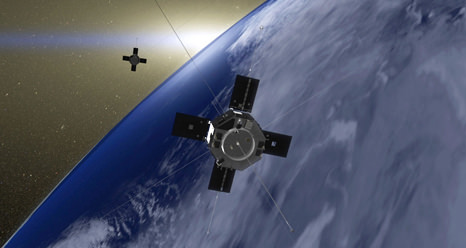The recently launched Radiation Belt Storm Probes (RBSP) mission, which is studying the Van Allen radiation belts, has now been renamed in honor of the late James Van Allen, who discovered the radiation belts encircling Earth in 1958.
“James Van Allen was a true pioneer in astrophysics,” said John Grunsfeld, astronaut and associate administrator for NASA’s Science Mission Directorate at the agency’s headquarters in Washington. “His ground breaking research paved the way for current and future space exploration. These spacecraft now not only honor his iconic name but his mark on science.”
During his career, Van Allen was the principal investigator for scientific investigations on 24 Earth satellites and planetary missions, beginning with the first successful American satellite, Explorer I, and continuing with Pioneer 10 and Pioneer 11. He also helped develop the first plans for an International Geophysical Year was held in 1957. Van Allen, who worked at APL during and after World War II, also is credited with discovery of a new moon of Saturn in 1979, as well as radiation belts around that planet.
Artist concept of the Van Allen Probes. Credit: NASA
Launched Aug. 30, 2012 from Cape Canaveral Air Force Station in Florida, the Van Allen Probes comprise the first dual-spacecraft mission specifically created to investigate the radiation belts that surround Earth. These two belts encircle the planet and are filled with highly charged particles.
The belts are affected by solar storms and coronal mass ejections and sometimes swell dramatically. When this occurs, they can pose dangers to communications, GPS satellites and human spaceflight activities.
“After only two months in orbit, the Van Allen Probes have made significant contributions to our understanding of the radiation belts,” says APL Director Ralph Semmel. “The science and data from these amazing twin spacecraft will allow for more effective and safe space technologies in the decades to come. APL is proud to have built and to operate this new resource for NASA and our nation, and we are proud to have the mission named for one of APL’s original staff.”


Seems like a very proper decision to make.